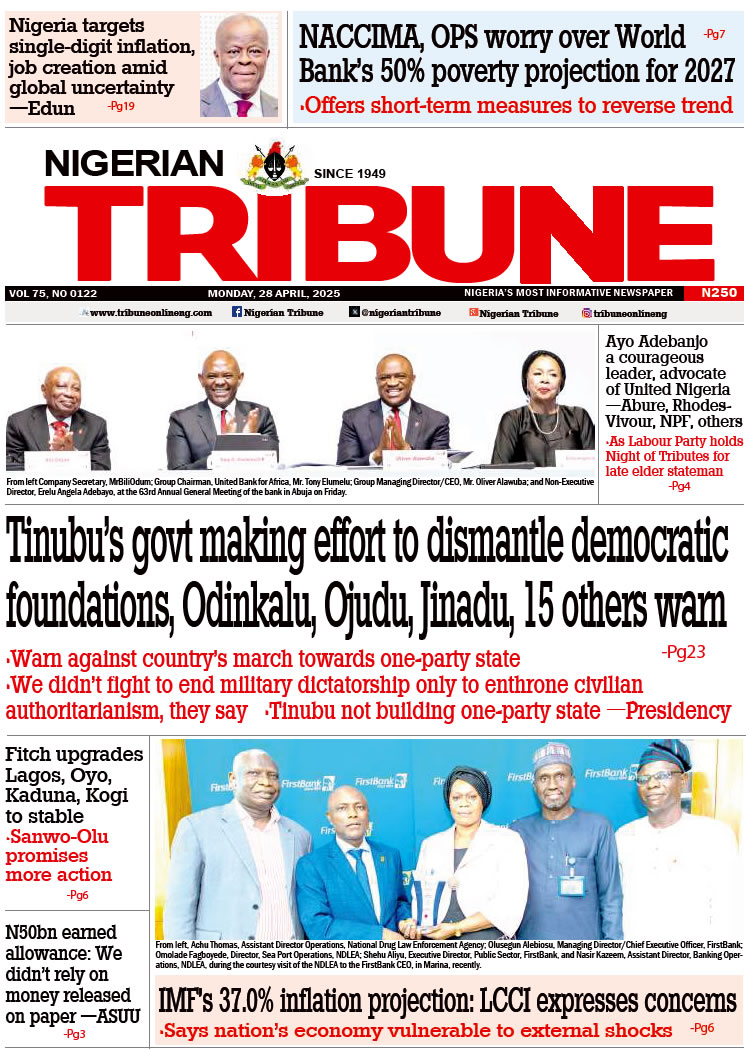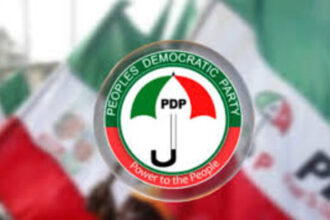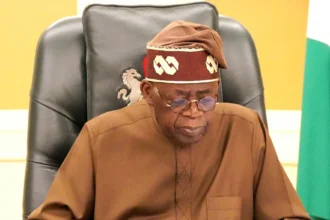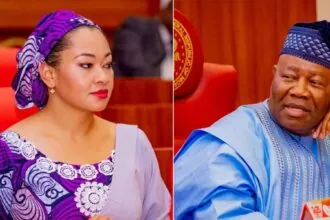For the umpteenth time, the National Assembly has been confronted with heads of some Ministries, Departments and Agencies treating with disdain summons to appear before ad hoc committees to shed light on issues relating to the activities of agencies under them. JOHN AMEH writes on the arguments and counter-arguments over the trend and the underlying constitutional framework.
Last week, the Senate bared its fangs, sending signals to heads of some Ministries, Departments and Agencies (MDAs) that it could soon execute arrest warrants against them for routinely ignoring standing committees invitations to investigative or public hearings before the parliament.
It started when an exasperated Chairman, Senate Committee on Ethics, Privileges and Public Petitions, Senator Neda Imasuen (LP, Edo-South), brought a complaint to the floor that some heads of MDAs had formed the habit of refusing to make appearances before the committee to help with investigations into key petitions and other pressing issues of public importance.
The President of the Senate, Senator Godswill Akpabio, in reinforcing the legislative powers of the committees, told Imasuen: “You already have the power as provided for by Section 89 of the 1999 Constitution. Please, use it by issuing a warrant of arrest against any head of agency refusing to appear before the public petition committee.
“Appearances of the invited people before the committee are very important for justice and fairness on issues raised against them in the petitions before the Senate through the Public Petitions Committee.”
The committee chairman came with a list of the ‘culprits’ already on the radar of the panel -Minister of Works, Senator David Umahi; Chairman of Nigerians in Diaspora Commission (NiDCOM), Honourable Abike Dabiri-Erewa; Head of Service of the Federation, Mrs Didi Esther Walson-Jack; chief executives of Union Homes Savings and Loans Plc; Enugu Electricity Distribution Company (EEDC); and Sally Best Properties Limited.
The truth is that last week’s scenario was not playing out for the first time. At both the Senate and the House of Representatives, lawmakers have engaged in this cat-and-mouse game with ministers and other heads of agencies for years. For instance, during the 7th Assembly (2011-2015); the 8th Assembly (2015-2019); and the 9th Assembly (2019-2023), the National Assembly and agency heads flexed muscles without end over repetitive and countless invitations/summons by the former and the reluctance of the latter to comply, resulting in tensed moments between both sides of government.
When he superintended over the affairs of the Central Bank of Nigeria (CBN) as the governor, Professor Chukwuma Soludo had a running battle with several committees of the National Assembly as his office received heaps of invitations to a point he realised that he was spending more work days at the legislative building than at the apex bank. On one particular day, an exhausted Soludo pleaded with a House committee chairman to provide an annex office for him to make his appearances less stressful for him.
Soludo remarked: “Mr Chairman, this (summons) is becoming too much. I am here almost every other day. At this rate, sir, requesting an annex office close to you wouldn’t be a bad idea; I believe you can assist in that regard.”
While that request by Soludo sounded hilarious, indeed, everyone in the hall burst out laughing, his point was not lost on the participants -that issuing summons over the minutest of issues -was becoming more of a distraction to other equally urgent public duties awaiting the attention of these agency heads.
Yet, in many other cases too, agency heads deliberately deplored trickery and other tactics to avoid honouring invitations in their bid to cover up alleged infractions and abuses of due process, usually the subject matter for which they have been summoned.
The power to investigate, issue summons, warrants
A background to the summons can be established. Agreed, the lawmakers are covered by law to invite or summon anybody, including the President of the country, in the cause of an investigation. This protection is given under Section 88 of the 1999 Constitution.
The section provides thus, “(1) Subject to the provisions of this Constitution, each House of the National Assembly shall have power by resolution published in its journal or in the Official Gazette of the Government of the Federation to direct or cause to be directed investigation into-
(a) Any matter or thing with respect to which it has power to make laws, and
(b) the conduct of affairs of any person, authority, ministry or government department charged, or intended to be charged, with the duty of or responsibility for –
(i) Executing or administering laws enacted by National Assembly, and
(ii) Disbursing or administering money appropriated or to be appropriated by the National Assembly.
“(2) The powers conferred on the National Assembly under the provisions of this section are exercisable only for the purpose of enabling it to –
(a) Make laws with respect to any matter within its legislative competence and correct any defects in existing laws; and (b) expose corruption, inefficiency or waste in the execution or administration of laws within its legislative competence and in the disbursement or administration of funds appropriated by it.”
This legislative power is further strengthened by Section 89, where the lawmakers are handed the power to issue warrants of arrest where anyone consistently ignores their summons in order to compel appearance.
Section 89 reads: “For the purposes of any investigation under section 88 of this Constitution and subject to the provisions thereof, the Senate or the House of Representatives or a committee appointed in accordance with section 62 of this Constitution shall have power to –
(a) procure all such evidence, written or oral, direct or circumstantial, as it may think necessary or desirable, and examine all persons as witnesses whose evidence may be material or relevant to the subject matter;
(b) require such evidence to be given on oath;
(c) summon any person in Nigeria to give evidence at any place or produce any document or other thing in his possession or under his control, and examine him as a witness and require him to produce any document or other thing in his possession or under his control, subject to all just exceptions; and
(d) issue a warrant to compel the attendance of any person who, after having been summoned to attend, fails, refuses or neglects to do so and does not excuse such failure, refusal or neglect to the satisfaction of the House or the committee in question, and order him to pay all costs which may have been occasioned in compelling his attendance or by reason of his failure, refusal or neglect to obey the summons, and also to impose such fine as may be prescribed for any such failure, refused or neglect; and any fine so imposed shall be recoverable in the same manner as a fine imposed by a court of law.
“(2) A summons or warrant issued under this section may be served or executed by any member of the Nigeria Police Force or by any person authorised in that behalf by the President of the Senate or the Speaker of the House of Representatives, as the case may require.”
There is no doubt that this power exists and compliance on the part of members of the executive arm is obligatory. However, a major bone of contention between both sides has been, how often? How should both arms balance the summons such that other government functions do not suffer? Is it not possible that in some cases, directors or experts directly in charge of the matter under investigation can represent a minister or agency head where the head is preoccupied with other official engagements? Would there be motives other than exposing corruption or seeking justice, behind the insistence that it is the head of an agency who must appear, no matter how busy the head may be? On their part, why do heads of agencies plot to dodge appearances before legislative investigation panels? These are a few of the questions that observers have consistently raised over the issue.
More striking is the fact that, besides exercising the power to investigate, summon or issue warrants, in many cases, hardly have these probes produced tangible results -implementation, arrests, prosecution and conviction -to serve as a deterrent to recurrences. Perhaps, armed with this knowledge, heads of MDAs find it convenient to play more of hide and seek with the lawmakers, especially when they are also aware that there are several other ways they can engage with the parliamentarians to reach a ‘truce.’
In March this year, President Bola Tinubu, too grew weary of the bombardment of his cabinet members with National Assembly summons, and he diplomatically applied humour to protest. Tinubu, while admitting that the National Assembly has a duty to oversight the executive, however, made an appeal during a Ramadan fast-breaking meeting with the Speaker of the House of Representatives, Honourable Tajudeen Abbas, that, “I have been watching various committees summoning ministers and heads of agencies. I have complained to the Speaker to let the poor breathe. Let these people do the job.
“We are not saying that you are not influential. We are not saying you cannot do your oversight. But consider the primary duty of each agency, its personnel, or the responsibilities of the Governor of the Central Bank of Nigeria or the Coordinating Minister of the Economy and Minister of Finance to you and the entire nation.
”If they are distracted or disturbed, maybe we will shift parliamentary sitting all through the night. We must find a way to accommodate one another. This is an appeal to you. See if you can accept representatives in some instances or even documentations.”
When the Senate threatened to issue arrest warrants arising from the Senator Imasuen committee hearing, the Presidency again deferred to the power of the National Assembly to carry out its duties, but equally called for fluidity in the manner the summons are issued.
“Under the leadership of President Tinubu, this administration is fully committed to upholding the principles of transparency, accountability, and service excellence. The President’s Renewed Hope Agenda is built on the premise of quick and efficient governance, one that brings tangible democracy dividends to the people without delay.
“A critical part of realising this vision involves a proactive, respectful, and transparent relationship between government bodies and the Senate in its oversight role,” the Special Adviser to the President on Senate Matters, Senator Basheer Lado, had said while intervening to calm frayed nerves. Urging the parties further for understanding, Lado stated: “The Office has noted some concerns that some agencies may not have consistently adhered to Senate invitations or requests for appearances before committees.
“While we acknowledge that competing official engagements may sometimes make it challenging for agencies to respond promptly to Senate invitations, it remains essential that these opportunities for engagement are prioritised to demonstrate our continued collective commitment to accountability and good governance.
“Engaging with Senate committees is an important opportunity for agencies to showcase their dedication to public service and accountability, while further reinforcing the people’s confidence in government.”
A political affairs analyst, Dr. Matthias Manu, holds the view that both arms “can actually work harmoniously, transparently and in compliance with democratic traditions” to deliver the responsibilities the citizenry requires of their government. “The problem of mutual suspicion, ego fight that is noticeable in their relationship raises concerns as to whether there are issues other than investigation for the public good that they are not telling Nigerians,” he adds.
READ ALSO: Ondo guber: INEC warns journalists against fake news








